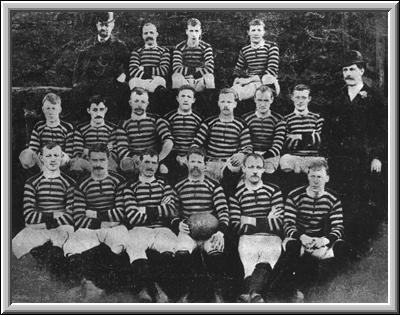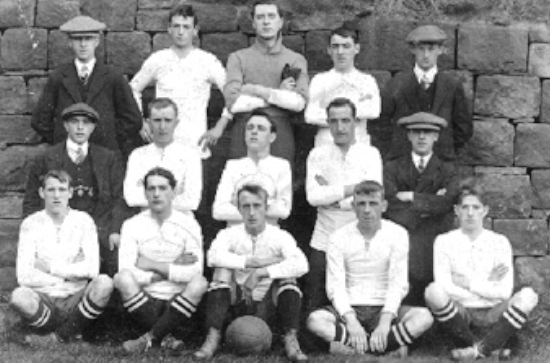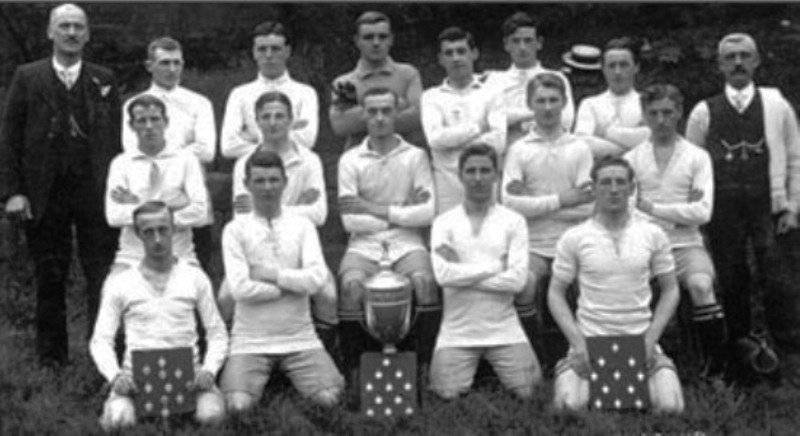With
a population of little over 10,000 it was unlikeley that a town
of that size, nestling in the hills on the west of the Pennines
would ever be able to support a professional sporting organisation.
However, since 1919 that is exactly what it has managed, often against
all the odds, to do! The town is called Mossley, a name shared by
it's Association Football Club, and this is the beginning of it's
story.
It
is unfortunate that the early years of football in Mossley are rather
poorly documented, but it is known that during the 1880's Rugby
Football was the town's major sporting activity and Mossley boasted
a team in the Rugby Football Union
The team, which played at Luzley,
a small hamlet on a hill on the North side of the town, survived
until the late 1890's before the ever increasing popularity of the
Association game took it's toll and the Rugby Club was forced to
disband.
Before
the split between amateurism and professionalism in rugby
football took place in 1895, there was no organised competitive
structure in the sport outside of county and international matches.
Club matches did take place but only by invitation, much like friendlies
today only on a home and away basis.
Details of this period in the sport are pretty scarce but it is
known that sevaeral Mossley players represented
the county and one, Abe Ashworth, played for England after he'd
moved to Oldham. In fact Abe Ashworth's move from Mossley
to Werneth was one of the contributing factors to the split.
Mossley accused the Oldham side of paying him to
play for them (a strict no-no in the amateur game) and an investigation
by Lancashire RU revealed that Werneth had offered him a new job
as an iron dresser on £1-7s-0d, an increase on the £1
he was earning as a weft carrier in the Mossley
mills. Ashworth was banned sine die and Werneth were suspended.
After a huge outcry though the suspensions were lifted and the ball
towards full professionalism in the sport began rolling.
A regular fixture around this time was Mossley
vs. Oldham but in 1893, after the last few meetings had 'degenerated
into a roughhouse', Oldham refused to play Mossley
again. Other clubs then took Oldham's lead and soon there was next
to no opposition for Mossley to play against; a
situation that forced them to turn to association football.

Mossley
Rugby Club - 1893
The
earliest recorded Association Football team in Mossley was established
around 1898 when a team known as Mossley Britania played in the
Ashton & District League Federation. They were joined the following
season by Mossley Albion and Mossley Amateurs, the latter of which
survived into the 1990's, along with Mossley Ramblers who played
in the Oldham & District League and a club named Mossley United
who entered several local cup competitions.
1903
saw the formation of another Mossley team known as Park Villa who
entered a couple of local cup competitions and played friendlies,
twelve months later a change of name saw them become Mossley Juniors,
the forerunners of Mossley AFC.
Mossley
Juniors FC entered the Stalybridge & District League in 1904 having
took over the old Rugby ground at Luzley. They opened their first
competitive season in poor style as they were hammered 9-1 at Dunham
Villa. The following week they faced another new Mossley club, named
Mossley Volunteers, and the Juniors recorded their first win by 2-1.
Other teams encountered that season were Gee Cross Lads, Mossley Ramblers,
Hurst St.John's, Earnshaw Ramblers, Shaw Hall United, Littlemoss,
Mossley St.Joseph's and Hurst MNC Reserves. At the end of the season
two players H & P Wood were selected to represent the League in
a challenge match against the champions Earnshaw Ramblers. The Juniors
finished the season with a record of;- played 20, won 6, drawn 1,
lost 13, goals for 32 aganst 51, with 13 points.
The 1905-06 season opened with a 7-0 victory over Dukinfield Villa
but form deteriated over the rest of the season and the Juniors managed
only three more wins, over Mossley Volunteers, Ebenezer Baptist and
Mossley St.Joseph's.
Mossley Juniors entered the Oldham & District League for the 1907-08
season and played in Division Two of that competition against such
teams as Townfield, Heyside Lads, Hollinwood Catholic, Greenacres
Lads and Waterhead United. Players who appeared for the Juniors that
season included Harry Thwaite, E.Pritchard, P.Wood, L.Shaw, R.Worsnip,
G.Tarr, B.Dyson, Harry Garside, C.Hall, Tom Swift, George Booth, C.Stead,
C.Hobbs, M.Capstick, J.Swift, Bob Britland, Joe Wood and Jack Flaherty.
The West End Amateur League was entered for the 1908-09 season and
the Juniors managed 3rd position having competed against Roaches Athletic,
Stalybridge St. Peter's, Millbrook MNC, Manchester Road, Hurst St.John's,
Ashton United (not the present one), Moorside Wesleyans, Dukinfield
Albion, Dukinfield St.Mary's and Ashton Baptist.
It was 1909 and Mossley Juniors, under the guidance of founder and
club secretary James T.Howarth, dropped the name Juniors and became
known as Mossley Association Football Club, entering the Ashton &
District League Division Two.
The first game as Mossley AFC was played on 4th September 1909 away
to the unlikely named Ashton Independant Methodists Mens Class, a
game Mossley lost 2-1, but a week later recordeed their first win
2-1 against Dukinfield St. Mark's. Mossley finished the season joint
top along with Ashton St. Peter's 2nd XI but lost a title deciding
play-off 3-2. However, the Club won it's first trophy defeating Ashton
IM 3-1. Amongst Mossley's other opponents that season were Hyde United.
Mossley
AFC - Ashton Junior Cup Winners 1909-10
Ashton League officials were concerned about the disbanding of several
clubs in mid season and so it was decided to discontinue the the 2nd
Division for the following season. Mossley were duly elected to the
First Division.
It was however to be an inglorious first season in the now one division
Ashton & District League with the team finishing 14th out of 15
clubs and failing to make progress in the cups. Of the players - team
captain Frank Jackman, Harry Laming (later Mayor of Mossley), Jepson
Shaw and Dick Whalley were the pick and it was consiedered by secretary
James T.Howarth that new players would have to be brought in to improve
the team for the following season.
The
arrival of winger Jackie Darley, new captain Jim Davies and goalkeeper
Billy Jackson along with the goalscoring exploits of Jack Flaherty
and Frank Jackman proved inspirational for Mossley who produced
an excellent season to win the Ashton & District League title
losing only one League game with a record of; Played 26, won 18,
drawn 7, lost 1, goals scored 76 against 19, points 43. Mossley
were also runners up in both the Ashton Challenge Cup and Lady Aitken
Cup. It was to be Mossley's, then nick-named 'The Luzleyites', last
season at the Luzley ground as they moved to a new ground more central
to the town, a disused cricket field and former tip named Seel Fold,
part of the Stamford Estate.

1912-13
season was Mossley's first at the new ground with headquarters at
the 'Highland Laddie Hotel' next door to the ground. It was also
Mossley's first season in the white strip that coined the nick-name
'The Lilywhites'. Previously the team had played in claret and sky
blue. On the field it proved to be a case of 'always the bridesmaid'
as they were runners up in the League, Ashton Junior Cup and Lady
Aitken Cup. One interesting feature about the early days of the
club was that it wasn't uncommon to play two matches on the same
day, and it was unfortunate for Mossley that it was on one such
day that they had to play the two cup finals.
The
1913-14 season was another fine one for Mossley AFC, finishing runners
up in the League to Droylsden and winning the Lady Aitken Cup in a
twice replayed final against Droylsden with over 13,000 spectators
attending the three games at Hurst Cross. 360 minutes football had
been played before Councillor W.Scholes was able to present the 'beautiful
Challenge Cup', presented by Lady Aitken to the Ashton & District
League, to Mossley captain Arthur Sugden. Gate receipts for the three
games were £168 12s 4d.
Marcroft
was the leading scorer with 25 goals and the 3,000+ that witnessed
the home fixture with local rivals Mossley Celtic was a new record
for Seel Fold, while 3,595 saw the Ashton Junior Cup final which
Mossley lost to Ashton St.Peter's at Hurst Cross.

Mossley
AFC - Ashton & District League Lady Aitken Cup Winners 1913-14
Mossley
had a new team captain for the 1914-15 season in Arthur Burman and
enjoyed another exellent season winning the Ashton & District
League and also the Manchester Junior Cup beating Middleton in the
final and the Lady Aitken Cup beating Denton St.Lawrence 2-1. Jack
Cockcroft was the leading scorer with over 25 goals including five
in a 7-0 win over Abbey Hey.
Mossley
AFC - Ashton & District League Champions, Manchester Junior Cup
Winners, Lady Aitken Cup Winners 1914-15
After four successful seasons in the Ashton & District League
the Mossley club decided it was time for a new challenge and they
joined the South East Lancashire League for the 1915-16 season. With
new centre forward John McMenemy scoring at will Mossley made a great
start to the season and were leading the table by four points when
on the 1st January 1916 it was decided at a meeting of the Mossley
AFC committee to disband the club for the remainder of the season
due to the war.
The following season the club re-formed in the belief that the war
would soon be over and they entered the Manchester Amateur League
and again made a great start with McMenemy's goals again a highlight.
Unfortunately it was to be another incomplete season.
At a meeting of the Mossley AFC held at the Highland Laddie Hotel
on 22nd January 1917, it was decided to disband the club for the duration
of the war. There had been a loss of several pounds on the season's
workings, mainly through other clubs failing to fulfill their engagements.
Several members of the team and also of the committee, had been
'called to the colours' and it was felt that the best
thing to do for the present was to close down.
No League tables were issued for the Manchester Amateur League but
the member clubs at the beginning of the season were:- Armstrong Whitworth,
Droylsden, Dukinfield, Edge Lane Athletic, Heaton Park, Mersey Athletic,
Mossley, New Moss Colliery, Openshaw, Partington Steel Works, Siemens,
Westinghouse and Woodhouses.
At
a meeting held on 11th December 1918 it was decided to re-form Mossley
AFC now that the war was over. The decision was taken to join the
Manchester Section of the Lancashire Combination for the season
to begin on 4th January 1919. Oddly enough Mossley were unable to
resume on that date as heavy snow prevented the scheduled home game
against Hurst from taking place. Average crowds for the season were
around the 2,000 mark and the club had had a very prosperous half
season commencing with a balance in hand of £26 and finishing
up with a balance of £76 on the right side. Jack Flaherty
and Jack Cockcroft were regular marksmen as Mossley finished runners
up in the section to Stalybridge Celtic. Altrincham, Hurst, Monk's
Hall, Witton Albion, Northwich Victoria and Marple completed the
section line up in a season that ended on 19th May.
A
general meeting held at the end of the season suggested that the
committee needed to decide what League to enter for the 1919-20
season. It was decided to rescind an earlier decision to rejoin
the Combination and to explore the prospect of joining a new League
for Cheshire that had been muted.
A
special meeting convened by the Cheshire Football Association was
held at the Mosley Hotel, Manchester and several clubs were invited
to join a new League to be known as the Cheshire County League. Mossley
were one of several clubs not invited at the time but who applied
later and were accepted.
It was decided at a later meeting of the Mossley AFC committee to
become a professional club for the first time and to employ as many
professional footballers as finances would allow.
The rest, as they say, is history!